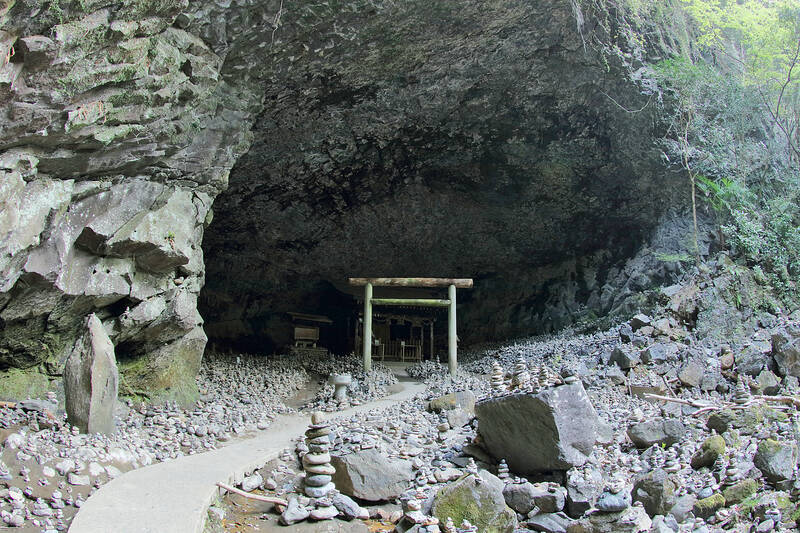The “torii” of Japan is one of the many symbols of the country. These simple yet mystifying gates dot the Japanese __1__. But where exactly do they come from, and what do they represent?
While the origins of these aesthetically-pleasing gates are not clear, many historians believe that they have been __2__ from India or China. In India, gates called “torana” appear at entrances to Buddhist and Hindu temples. The name torana also sounds a bit similar to torii, which further __3__ the theory. In China, similar structures known as “pailou” are built at the entrances to Buddhist and Taoist temples as well. Japanese legend, however, says differently.
According to the “Kojiki,” a collection of myths written in 712 about Japan and its local deities or kami, the origin of torii has to do with Amaterasu, the sun goddess of the Shinto religion. She became outraged by her __4__ brother’s destructive behavior. She then locked herself in a cave, plunging the world into __5__. Other kami thought of a way to entice her to come out: to get the bird of the morning to call out. They __6__ a perch in front of the cave and positioned roosters on it. This perch was the first torii. Upon hearing the roosters call, Amaterasu emerged to see what was going on, returning light to the world. The story sounds __7__ since the Japanese characters for torii literally mean “bird home.”

Photo courtesy of Shutterstock 照片:Shutterstock 提供
The torii __8__ the border between the living world and the spirit world. When one crosses through a torii, they are entering __9__ land, the land of the kami. Each torii that a person passes through means they are entering a land holier than the last. When leaving a temple, it’s important to leave through all of the gates you walked through when entering; otherwise, you’ll be __10__ in the spirit world. So, the next time you’re admiring a temple in Japan, remember to be respectful towards the kami and return to our world safe and sound.
日本的「鳥居」是該國的眾多代表標誌之一。日本地景上星羅棋布著這些簡單卻神祕的門。但它們究竟源自何方,它們又代表了什麼?
雖然這些外觀精美的門之起源尚不明,但許多歷史學家認為它們是從印度或中國傳入的。在印度,稱為「托拉納」的門出現在佛教和印度教寺院的入口處。托拉納這個名字聽起來也跟鳥居的日文發音(torii)有點類似,這進一步增加了該理論的說服力。在中國,被稱為「牌樓」的類似建物也設於佛寺和道觀的進門處。然而,日本的傳說卻有不同的說法。

Photo courtesy of Shutterstock 照片:Shutterstock 提供
根據《古事記》──寫於712年,有關日本與當地神祇(神祇日語念作kami)的一本神話集──鳥居的起源與天照大神有關,其為神道教的太陽女神。祂對自己邪惡弟弟的破壞行為感到憤怒。後來祂把自己關在洞穴之中,使得世界陷入黑暗。其他神明想了個辦法引誘祂出來:讓司晨之鳥大聲呼叫。祂們在洞穴前安裝了一個棲木,並將公雞放在上頭。這個棲木便是最初的鳥居。一聽到公雞的叫聲,天照大神便現身出來看看發生了什麼事,這讓世界重返光明。這個故事聽起來很合理,因為鳥居的日文字面上意思即是「鳥之家」。
鳥居代表了人界和神域之間的邊界。當一個人穿越一道鳥居,他就進入了神聖的土地──神祇的領域。一個人經過的每一道鳥居意味著他正踏上比前一處更神聖的土地。離開寺院時,很重要的一點是要走過進寺院時穿過的每道鳥居;否則,你會被困在神域中。因此,下次你在日本觀賞寺院時,記得對神明保持敬重,並平平安安地回到我們的世界。
What Did You Learn?

Photo courtesy of Shutterstock 照片:Shutterstock 提供
答案:1. (G) 2. (F) 3. (C) 4. (B) 5. (E) 6. (D) 7. (I) 8. (J) 9. (H) 10. (A)
Words in Use
1. spiritual a. 宗教的;心靈的,精神的
Mohammed was a spiritual leader.
穆罕默德是一位宗教領袖。
The novel focused on the main character’s spiritual growth. She became tough in the end.
那本小說著重在主角的心靈成長,她最終變得堅強。
2. aesthetic a. 美觀的;美學的
From an aesthetic perspective, the design looks cool. However, it’s not practical.
從美學的角度來看,那個設計很酷。然而它並不實用。
3. theory n. 理論
The evidence Ken provided doesn’t back up his theory.
阿肯所提供的證據無法支持他的理論。
4. legend n. 傳說,傳奇故事
According to legend, Robin Hood was a hero that robbed the rich and gave to the poor.
根據傳說,羅賓漢是一位劫富濟貧的英雄。
5. myth n. 神話
Greek myths are stories about gods like Zeus.
希臘神話是關於宙斯等神明的故事。
Practical Phrases
1. have to do with... 與…有關
Your headache might have to do with your lack of sleep.
你的頭痛可能和你睡眠不足有關。
2. call out 大聲喊叫
Seeing the man trapped under a car, Katy called out for help.
看到男子被困在車底,凱蒂大聲呼叫救援。
3. safe and sound 安然無恙
The hiker was lost in the mountains for days. Fortunately, he returned home safe and sound.
登山者在山上迷路好幾天,幸好安然無恙地回家了。
聽文章朗讀及講解: https://ivy.pse.is/455bfu
本文出自常春藤解析英語雜誌: www.ivy.com.tw

Rice is essential to Japanese culture, tradition and politics. People take pride in the oval-shaped sticky Japonica grain, which is still a staple even though total consumption has fallen over the decades. But since last summer, prices have soared as supplies have fallen short of demand. The government has long paid farmers to cut back on rice acreage, and change to other crops to keep rice prices relatively high. To cope with shortfalls this year, the government has released rice reserves. But the grain has been slow to reach supermarket shelves. Anger over that was part of the reason the Agriculture Minister

Step into any corner of Turkiye, and you’ll likely encounter the iconic “Evil Eye,” known as “nazar boncu?u” in Turkish. This striking blue glass ornament is shaped like an eye with concentric circles of dark blue, white, and light blue. While its name in English suggests something threatening, it’s actually a charm designed to ward off misfortune. The origins of the nazar boncu?u can be traced back to ancient Mediterranean and Middle Eastern traditions. The word nazar comes from Arabic, meaning “gaze,” while boncu?u translates to “bead” in Turkish. Central to the nazar boncu?u’s mythology is the idea that

A: Wow, Les Miserables Staged Concert Spectacular is visiting Taiwan for the first time. B: Isn’t Les Miserables often praised as one of the world’s four greatest musicals? A: Yup. Its concert is touring Taipei from tonight to July 6, and Kaohsiung between July 10 and 27. B: The English version of the French musical, based on writer Victor Hugo’s masterpiece, has been a huge success throughout the four decades since its debut in 1985. A: The musical has never toured Taiwan, but going to the concert sounds like fun, too. A: 哇,音樂劇《悲慘世界》紀念版音樂會首度來台巡演! B: 《悲慘世界》……它不是常被譽為全球四大名劇之一嗎? A: 對啊音樂會將從今晚到7月6日在台北演出,從7月10日到27日在高雄演出。 B: 這部法文音樂劇的英文版,改編自維克多雨果的同名小說,自1985年首演以來,在過去40年造成轟動。 A:

Continued from yesterday(延續自昨日) https://www.taipeitimes.com/News/lang In 1946, the company adopted the name 7-Eleven to reflect its newly extended __3__, from 7am to 11pm, a novel concept at the time. As a rapidly growing company, it began offering franchise opportunities in the 1960s. In 1974, the first 7-Eleven in Japan was opened by the supermarket company Ito-Yokado. The Japanese franchises were __4__ successful that by 1991, Ito-Yokado was able to acquire a 70 percent stake in Southland Corporation. Its investments eventually resulted in full ownership of 7-Eleven, which paved the way for the Japanese company to enter the international market. Since then, 7-Eleven